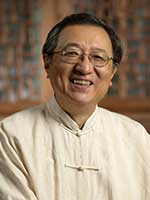知名院士學者
鄭培凱教授 (Prof. CHENG Pei-kai)

鄭培凱,山東日照人,臺灣大學外文系畢業。一九七O年獲耶魯大學歷史學博士學位。在美國留學期間,主要鑽研明代以後的歷史,比較東西方的文化交流。曾任教於紐約州立大學、耶魯大學、佩斯大學、臺灣大學、清華大學。一九九八年在香港城市大學創辦中國文化中心,並擔任中心主任及教授。同時兼任香港藝術發展局、康樂及文化事務署顧問、民政事務局非物質文化遺產諮詢委員會委員、港臺文化合作委員會委員、浙江大學中國文化客座教授、逢甲大學特約講座教授等職。
研究範疇包括中國文化意識史,涉及藝術思維、藝術創作、藝術欣賞、評論與文化思維的關係和文化美學等。文藝創作以現代詩及散文為主。現今主要負責的研究專案有:二十世紀崑曲傳承、陶瓷下西洋、茶與中國文化、經典翻譯與文化思維等。
鄭教授在《筆墨瀲灩》前言中提到:書法是線條藝術,也是空間中線條流動的藝術。字跡流動的空靈或滯重,牽動人們的情感與脈動,影響人們的心境與情緒。再加上文字內容所蘊積的文化感染,便會編織出錯綜複雜的藝術展現,凝聚成生生不息、可持續發展的書法藝術傳統。
Professor Cheng Pei-kai joined CityU in July 1998. Having received his PhD in History from Yale University, Prof Cheng taught at State University of New York at Albany, Yale University, Wesleyan University, Pace University (New York City), National Taiwan University and National Tsinghua University, gaining almost 20 years' experience in the profession, before joining CityU.
Prof Cheng's studies focus on Chinese history of consciousness. He is also a poet. He authors Tang Xianzu and Late Ming Culture, Zhenli Yuebian Yuehun (Truth and Chaos), Gaoshang De Kuaile (Noble Happiness), Selected Prose of Dai Wangshu, etc. He edits Kouchuan Xinshou Yu Wenhua Chuancheng, China Westward : Bibliography and Research Guide : Chinese Porcelain and East-West Maritime Trade, 12th – 15th Centuries, and The Search for Modern China : A Documentary Collection, with M. Lestz & J. Spence.
He leads projects funded by the university, including "China Westward : Chinese Porcelain and East-west Maritime Trade", "Excavated Ceramics as Hong Kong History : Tuen Mun and Yuen Long from 9th to 15th C", and "Chinese Aesthetics in Action : Zhejiang Painters in Japan in the 17th Century" etc.
Prof Cheng has served as Chairman of the Advisory Board for General Education Programme, Lingnan University; (Academic Board Member of the School of Chinese Cultural Studies,) Fudan University; Honorary Adviser to Leisure and Cultural Services Department; Advisor to Hong Kong Arts Development Council; and also Academic Advisor to Zhejiang Kunqu Opera Theatre Troupe, PRC.